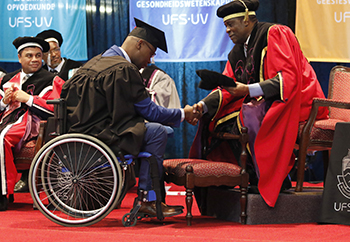Latest News Archive
Please select Category, Year, and then Month to display items
31 January 2024
|
Story EDZANI NEPHALELA
|
Photo ANJA AUCAMP
 Dr Martin Laubscher’s thesis, crowned with the Andrew Murray-Desmond Tutu Prize, is testament to the university’s unwavering commitment to scholarly excellence.
Dr Martin Laubscher’s thesis, crowned with the Andrew Murray-Desmond Tutu Prize, is testament to the university’s unwavering commitment to scholarly excellence.
In a historic triumph that reverberates over four decades since its inception, the UFS has clinched the coveted
Andrew Murray Prize – now renamed the Andrew Murray-Desmond Tutu Prize – for the first time. Standing shoulder to shoulder with institutions such as the University of Pretoria (UP) and Stellenbosch University (SU), this achievement marks a significant milestone in the UFS’ journey.
At the heart of this accomplishment lies the profound contribution of
Dr Martin Laubscher, distinguished Senior Lecturer specialising in Practical and Missional Theology in the
Faculty of Theology and Religion. Dr Laubscher’s dedication and scholarly prowess culminated in the groundbreaking work titled
Publieke teologie as profetiese teologie? (Public theology as prophetic theology), a revised edition of his doctoral thesis, which was originally crafted at Stellenbosch University in 2020, with a focus on the eminent Karl Barth.
Dr Laubscher received the Andrew Murray Prize for Theological Books in Afrikaans for his research and insightful analysis. The journey started when he realised, under the guidance of his study leader,
Prof Dion Forster, that his script had the potential to be published in Afrikaans. Sun Media’s interest in publishing this work in Afrikaans, led to it being the first-ever published thesis in Afrikaans. Dr Laubscher recalls, “I was grateful and excited about Sun Media’s interest. The book emerged within a year, and during a celebratory launch Prof Forster suggested I submit it for the Andrew Murray Prize.”
Earlier this year, Dr Laubscher was excited to learn that he was being shortlisted for the prestigious award. Reflecting on the significant moment, he shares, “The elation I felt upon receiving the news was unparalleled. I was not only celebrating a personal triumph, but also etching my name as the first laureate from our faculty to secure this prestigious accolade.”
Largest number of CUADS graduates at UFS
2017-07-03

During the mid-year graduation ceremonies at the
University of the Free State (UFS), the Centre for
Universal Access and Disability Support (CUADS) saw
the largest number of students with disabilities graduating.
Photo: Johan Roux
During the mid-year graduation ceremonies at the University of the Free State (UFS), the Centre for Universal Access and Disability Support (CUADS) saw the largest number of students with disabilities graduating.
For the first time since being established in February 2001, a total number of 30 students graduated, of which seven were postgraduate students.
Accomplishing your dreams as a student
Martie Miranda, Head of CUADS, says that one cannot help but become emotional with joy and happiness. “The feeling of satisfaction we feel with the graduates is so valuable, because it’s a reminder of their abilities to accomplish their dreams just like any other student.”
CUADS aims to ensure that the UFS creates opportunities for students with disabilities, aiming to become a higher-education institution recognised for its efforts in human reconciliation. Together with the Exam Division, CUADS coordinates alternative assessment with an accessible test and examination facility housed at CUADS. This accommodates students with concessions, amanuensis, specialised equipment, and accessible formatted papers.
Changing the challenges you experience
Miranda continuously encourages students to keep going. “If being successful is important to you, you will find a way to change the challenges you experience into opportunities. Either to learn something about yourself or teach someone else something.”
Below are the number of graduates from each faculty:
• Faculty of Law: 2
• Faculty of Economics and Management Sciences: 4
• Faculty of Education: 4
• Faculty of Natural and Agricultural Science: 9
• Faculty of the Humanities: 11